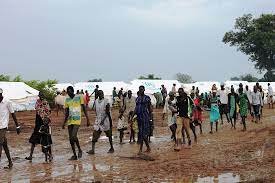Climate change impact in Honduras forcing people to flee to avoid starvation and water crisis
“Many communities face the combined impacts of climate change, mining, hydro-electric dams, deforestation and large scale agro-industries, such as African palm plantations,” the expert said.

The impact of climate change on poorer communities in Honduras is having a devastating effect on livelihoods, forcing many people to flee the country to avoid starvation and lack of safe drinking water, a UN expert said today.
“Communities in Honduras have faced prolonged droughts, severe flooding due to hurricanes, coastal erosion and coastal inundation due to climate change. This is forcing people to leave their homes and seek more sustainable livelihoods in other countries,” said Ian Fry, UN Special Rapporteur on the promotion and protection of human rights in the context of climate change in a statement at the end of an official visit to the country.
Fry said that the government of Honduras was trying to protect its citizens from the impacts of climate change, but far greater efforts were needed to stop the exodus of people from the country. “Those that do leave need better protection as they make the treacherous journey northward,” he said. During his visit, the Special Rapporteur met with community members from various regions across the country who had stories of hardship from the impacts of climate change. Fry heard reports of community members migrating due to desperation brought on by droughts, floods, landslides, sea level rise or coastal erosion. He found that the legacies of Hurricanes Iota and Eta were still being felt today.
“Many communities face the combined impacts of climate change, mining, hydro-electric dams, deforestation and large scale agro-industries, such as African palm plantations,” the expert said.
Fry expressed particular concern about the intimidation of environmental human rights defenders. During his short visit, three environment human rights defenders were attacked, and one was killed.
“Honduras is one of the most dangerous countries in the world for environmental human rights defenders,” the UN expert said.
“The Government must do much more to protect environmental human rights defenders from attacks by business interests, government officials, corrupt police and gang members,” Fry said. “Many communities live in fear and psychological trauma due to constant intimidation,” he said.
The Special Rapporteur urged the government to rescind laws being misused to imprison environmental human rights defenders.
In his recommendations to the government, Fry called on the government to update climate change laws and planning and establish a special climate change relief trust fund to provide targeted finance for the poorest and most affected communities. He also urged the Honduran government to engage more actively in international negotiations around a global loss and damage fund for people affected by the impacts of climate change.
The Government should carefully consider the suitability of hydro-electric dams and instead explore other renewable energy technologies that would not affect people’s right of access to safe drinking water, the Special Rapporteur said.
To improve the government’s responsibility to the public the Special Rapporteur recommended that it sign the Regional Agreement on Access to Information, Public Participation and Justice in Environmental Matters in Latin America and the Caribbean (Escazu Agreement).
Fry encouraged the Honduras government to have an exchange with other countries in the region to give proper protection to people displaced across international borders due to climate change. These people are not defined as refugees under the UN Refuge Convention and hence lack full protection of their rights.
“We must ensure that people displaced across international borders due to climate change are ensured the same rights as those afforded to refugees,” the expert said.
The Special Rapporteur will present a comprehensive report of his findings and recommendations to the Human Rights Council in June 2024.
- READ MORE ON:
- Honduras
- Climate change










